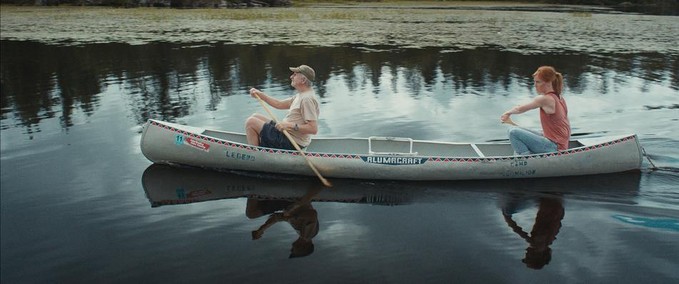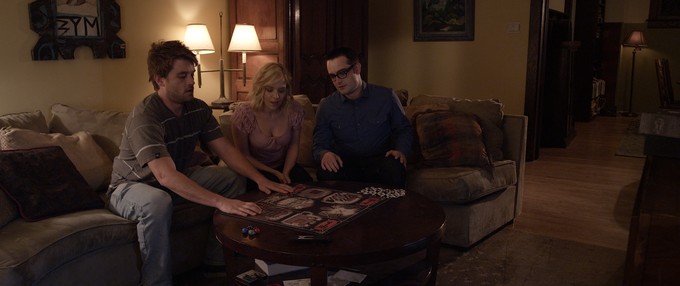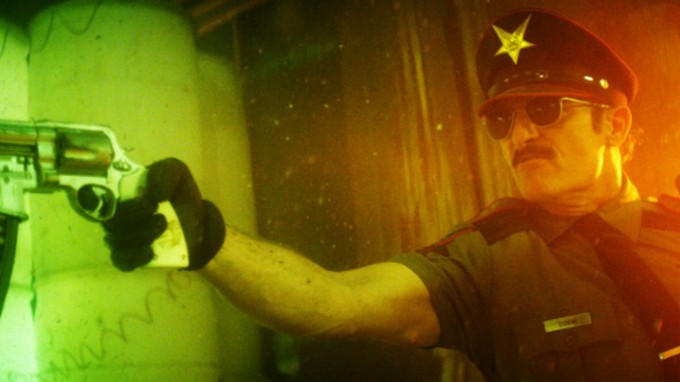
BLOOD STRIPE, dir. Remy Auberjonois
Three huge aspects of American life that aren’t too deeply explored in mainstream cinema: PTSD, church groups, and unglamorous, badder-than-shit tough girls. This debut feature from Remy Auberjonois (son of Odo from DEEP SPACE NINE, Rene Auberjonois, who also features in the film) incorporates all three into the story of an unnamed former Marine, played by Kate Nowlin (the director’s wife), and her attempt to strip away the anguish that she’s brought back with her from her last tour by living a simpler life out in the woods.
Sergeant (we never hear her real name) is just coming home after her latest post in the Middle East, and she’s having a tough go at it. Her relationship with her husband (THE KNICK’s Chris Sullivan) isn’t reforming at an optimal speed, and her efforts to reconnect with her old habits and social circles are failing miserably. She gets a foreman job far from home, but unceremoniously quits and heads home. On the road home, she happens upon a lakeside summer camp that she used to attend as a kid, and she lands a job tending to the cabin and grounds as they prepare to wrap up for the season. In the quiet woods and serene waters, she finds peace, but two things come around the corner that threaten her newfound tranquility: a church group heading to the camp for a yearly retreat, and a couple of Metallica-listening redneck types that may or may not be lugging something around that has the shape of a human body…
Normally, a film like this would take on the trappings of a melodrama, a hopeful parable, or a horror film, but Auberjonois is smart enough to swirl all three into his portrayal of this haunted, psychically wounded Marine. There’s little of the cloying sentimentality that sometimes permeates films about veterans, and a lot of very skillful sound and editing work that creates a sense of terror out of otherwise humdrum, ordinary daily occurances. It’s a unique cinematic portrayal of PTSD, less about pointed outbursts and more focused on the constant, little threats that build into a permanent, unshakable sense of tense unease.
This is aided by an excellent central performance by Nowlin, who co-wrote the film and, shockingly, is not an actual veteran. Tough, unglamorous, and ripped to shreds, Nowlin’s character is not one that we’re used to seeing at the forefront of a picture, and she’s able to let us into the mind of this inscrutable character without ever pandering or overacting. There are certain things she does that seem illogical or even sometimes crazy, but because of Nowlin’s acting and the way Auberjonois shoots her, we can always sympathize with her and understand the basic source of her impulses. It’s an incredibly physical performance, filled with jogging, swimming, and undie shots, and I still can’t believe how convincing Nowlin is as a cut-from-iron, muscle-covered badass. That we get to see past the hardened exterior at the stuggling, human core underneath speaks to Nowlin’s abilities, her connection with the script she collabed on, and her apparently fluid working relationship with her husband.
The Minnesota locales are gorgeous, and are shot magnificently by Radium Cheung (TANGERINE). Auberjonois really maximizes the lakeside camp setting, with some gorgeous color spectrums and long, lingering shots of the rippling lake as Nowlin swims and canoes across it. Generally, the emphasis on nature and the simplicity of this quiet life are well conveyed, and the tone makes it very clear why Nowlin’s character’s soul responds better to this environment than the more familiar one that her husband and friends reside in. It’s a quiet, somewhat slow film, very focused on behavior and small, subtle interactions, which is to its benefit and gives it a lot of its charm. The tension comes out in more psychological, BLACK SWAN-like flourishes rather than cheap, external threats to Sergeant’s psyche and/or life. In fact, the biggest stumbles the movie makes are in more traditionally sensational elements like a forced love interest and a somewhat extraneous, thriller-esque scene where Sergeant has to hide from some locals in a porta-potty. But generally, this is an effective, potent piece, one which utilizes its small scale and intimate nature to its advantage, and with a powerful, largely physical lead performance that is impossible to scoff at. There are an infinite amount of ways to deal with the Iraq and Afghanistan wars, and the generation of young soldiers traumatized by them, and I don’t think I’ll ever see another approach quite like this one.

BEYOND THE GATES, dir. Jackson Stewart
Wouldn’t you know it, another indie homage to ‘80s horror, complete with Carpenter-esque synth soundtrack (courtesy of WE ARE STILL HERE’s Wojciech Golczewski) and a preoccupation with outdated tech, once again VHS tapes. It’s a genre trend that has lasted maybe a little longer than necessary, and has produced enough Carpenter, Cronenberg, and Coscarelli homages to placate any fan of the onetime “Video Nasties”. But Jackson Stewart’s writing and directing debut smartly distinguishes itself by maintaining a fairly straightforward tone, incorporating some interesting narrative ideas, and executing a few killer gore moments with A-grade precision.
The hook here is “a VHS board game that kills you.” Simple right? Well, as usual, there’s two narratives here, the external (two estranged brothers find a killer board game in their missing dad’s dilapidated VHS shop) and the internal (they have to reconnect and get over the memory of their father together). Graham Skipper plays Gordon, the straight-arrow one, who is returning to their hometown after achieving some success and marrying the smart, supportive Margot (Brea Grant). Gordon’s brother, John (Chase Williamson), stayed in town and mostly drinks his days away, but holds a grudge against Gordon for not coming home when he heard his dad was missing. The two dig up the “Beyond The Gates” game in their dad’s long-locked office, along with its accompanying VHS tape, and are intrigued enough by the video’s image of a black-and-white, spooky looking Barbara Crampton (excellently used) to give the game a whirl. Before they even realize it, three things have become clear: the game has some connection with their pop’s disappearance, it locks you in psychically until you complete the game (or die), and, probably most distressingly, it’s got a life of its own, moving the pieces around the board like JUMANJI and taking itself out of the garbage when they try and throw it out. Without really knowing the extent of what they’re getting into, Gordon, John, and Margot play through the game in an effort to find the old man, break the link between them and it, and put an end to the bizarre deaths that are beginning to crop up around town.
The premise is inherently cheesy, so major props to Stewart and co-writer Stephen Scarlata for playing things fairly straight, and for mostly eschewing the camp that would’ve likely drowned another filmmaker’s version of this story. The problem is, they sort of want to have their cake and eat it too. They insert big, goofy gore moments and the occasional purposefully corny element that kill a lot of the momentum the film’s got going for it, and that are all the more glaring due to the relative dour seriousness of everything around it. A bit clearly designed to please the audience, like an exploding head or a reference to lost 80s DTV horror films (and one forced TAXI DRIVER joke), is typically immediately followed up by a serious dialogue scene that brings the tempo all the way back down after spiking considerably. One character, the owner of a magic shop (Jesse Merlin) who may know a thing or two about the game, is portrayed in such an over the top fashion, from his performance to his getup to the set he stands in, that it brings the movie to a screeching halt, and kills a lot of the straightforward horror vibe that the film so desperately wants to build. If the movie knew how to balance its dramatic side with the ‘80s kitsch and the more sensational horror elements, it could’ve been something really special, but every time one side of the film builds, the other side clashes with it and keeps the whole thing from popping off and achieving true awesome.
One aspect of the film that never relents is yet another too-good-for-this-film performance by Graham Skipper (CARNAGE PARK, Joe Begos’ ALMOST HUMAN and THE MIND’S EYE). His films with Begos were also ‘80s horror homages, and Skipper (alongside the memorable Josh Ethier, who edited here) provided a human, beating heart to HUMAN while staying straight-faced while MIND’S EYE spun off the rails around him. Here, he cuts the only complicated figure in the film, a former drunk trying and failing to escape the legacy of his obsessive, bizarre father. He has to play a lot of cards here: Gordon’s gotta deal with his bumbling, guilt-trip-laying brother, his awful memories of living in their family house, AND the increasing mind-control of the game. His co-stars, Grant and Williamson, don’t leave the same impression, and the latter goes for maybe one too many relief-joke lines, but Skipper’s intense, no-bullshit performance, the only type I’ve yet to see from him, deserves recognition.
There’s some stuff here that works really, really well. The idea of a VHS store as a sort of graveyard for mysterious, missing artifacts may have been done before, but in 2016, it has an unusual effect, as these guys are clearly old enough to remember the ubiquity of tapes but with the distance to recognize them as an archaic, borderline-unsought format. A whole generation likely has no idea that these VHS board games ever even existed, and the premise is able to work the weird, often sloppy presentation of those games to its advantage (is the woman in the video supposed to wait that long between moves, or is she waiting for you to do something?). The gore moments that eventually start springing up are really exciting and cool, even if the gimmick that causes some of them (some sort of voodoo doll) seems a little underexplored.
More than anything, I’m a fan of Stewart’s decision to mostly avoid making fun of VHS and the culture surrounding it, and to try and make the story of these two brothers getting over their dad as important, if not moreso, than the “horror” plot surrounding it. It’s something a lot of these contemporary synth-scored horror flicks with ‘80s themes forget to do, which is to treat itself like an actual movie, a sincere entry into the genre, not a love letter to other, more effective movies that had the balls to take themselves seriously. But I can’t help but think that if Stewart were a few years older, or a few more movies down the line, he would been able to rectify the tonal imbalance and occasional dips into bargain-basement cheese that keep this film from achieving its true potential. This is one of those where I responded to some stuff so strongly that I felt let down by the stuff that didn’t work so well, and I’m still on the fence as to whether there’s enough there for people who aren’t necessarily fans of THE GATE or the various other ‘80s films this pays homage to. What I do know is that Stewart may have the goods, and by mostly refusing to take the piss out of his own story, despite the easy potential to do so, has already shown a confidence and ambition that makes me want to see if the movie surrounding his next array of head explosions and smoke-and-neon-drenched sets will be one that, to paraphrase Parliament, tears the roof off the mothersucker.

OFFICER DOWNE, dir. Shawn Crahan
You immediately recognize Kim Coates, even if you don’t know his name, as he walks in slow-motion towards the camera in a bizarre LAPD uniform while he monologues like DREDD about cleaning up the filth of the city. Coates has one of those faces and has appeared in enough stuff (films as varied as LAST BOY SCOUT, WATERWORLD, OPEN RANGE, and GOON) that seeing him immediately conjures up memories of one or more of his many roles, usually as a heavy or a sleazebag. But here, with his clipped stache, aviators, and ratcheted-to-11 intensity, his image is reconfigured into that of the titular cop, a take-no-shit, fascistic LA officer that quite literally dies hard…as in every time he dies on the job, the LAPD hooks him up to a bunch of cables and zaps his ass back to life. Call him Frankencop (the reference is thankfully not lost on the film’s characters).
After a dynamite, gory-as-hell opening scene showing off what Coates’ Officer Downe and his double-barreled, custom .85 Magnum can do, the story flips into a much more palatable, typical narrative. Rookie a.k.a. Gable (Tyler Ross) is promoted to a very specific unit by his by-the-book, straight-out-of-an-‘80s-cop-show chief, one tasked with backing up Officer Downe as he “cleans up” the city. Not like Downe needs backup, typically, nor wants it; in fact, the unit is told to keep out of sight at all times, lest they “piss him off.” While his partners are content to stay back and sweep up after Downe has done his thing (and, usually, is laying bullet-riddled and dead amidst the carnage), Rookie wants to play a more active role in these busts, and alienates his squad by jumping into the action and even occasionally getting in Downe’s way. Meanwhile, a group of anthropomorphic, criminal beasts called Fortune 500 continue to plot Downe’s ultimate, final demise, using the help of a kung-fu legend named Zen Master Flash and a convent of killer nuns led by the merciless Mother Supreme.
This is the first feature from Slipknot’s Shawn Crahan (a.k.a. Clown), and it wears its B-movie tone and aesthetic with a surprising amount of pride. The myth of Downe is handled excellently, all fixed-object righteous doom matched with a careful, show-stopping performance by Coates, and the film does ultimately boil down to Downe’s rampages and everything in between. After countless movies like KRULL and GET CARTER where the lead character doesn’t really use his big signature weapon all that much, it’s awesome to see how much mileage they get out of the massive, unholy .85 revolver, and how many exploding torsos and heads we get to see it induce. The sets and visual ideas (including a green-lit room full of ALS victims and a convent full of killer nuns) are inherently stylized and striking, and Crahan (like the more clever music video directors) knows how to embrace the low-budget trappings while letting the ideas and the extreme gags run wild across the screen. It feels like the kind of grungy, underground comic that the character was sourced from (co-creator Joe Casey wrote the script), all crazy colors, outlandish logos, and hyper-posing, and that provides a level of charm that smoothes out the film’s rougher edges.
I’m of two minds about my main complaint regarding the film, namely the decision to focus on Rookie and keep Downe as a supporting character in his own film. On one hand, we all know that JAWS is JAWS and not JAWS II, III, or IV at least in part because of how little we actually see him in the film, and I’ve awaited Todd MacFarlane’s SPAWN film about Sam and Twitch with Simmons as a background character for as long as I can remember. There is definitely something to be said for not overusing your badass, cut-from-awesome centerpiece character, as evidenced in the difference between Marv’s impact in SIN CITY versus his repeated catchphrases and seeming omnipresence in A DAME TO KILL FOR. But man, the scenes with Rookie and the chief reek of low-fi cheapness, like bargain-basement DTV exposition shoved into a far better, cooler movie. Even the interplay between Downe’s backup crew seems like filler in between time with Downe, who spends roughly half the film either offscreen, kidnapped, or straight-up corpsed. Now, I’m not stupid, and know that a film with wall-to-wall Downe crazy would likely wear thin fast, and that the DREDD vs. JUDGE DREDD approach of seeing him through the eyes of his new rookie partner is a smart way to keep him from seeming too boring from overexposure or too soft with sentiment (though there’s a sweet, extended payoff that Coates pulls off magnificently towards the film’s end). But that doesn’t keep many of the scenes without Downe feeling like the downtime (heh) between the good shit, namely the Officer talking up his own myth and laying the smack down on the filth of “Motherfucking L.A.” (as the opening titles describe it).
There are definitely similarities between this film and DREDD, from the fascistic bent of the title character (who never seems to actually arrest anybody) to the wide-eyed-rookie plot and the colorful villains that permeate the landscape (the sometimes-subtitled, sometimes-dubbed Zen Master Flash is a winning creation). But this film is grimier, wilder, and, shockingly, more violent than that film, and has a fresh mix of straight-forward attitude and tongue-in-cheek, over-the-top mayhem. The somewhat low-budget action has flourishes of kinectic brilliance (a couple of Downe’s moves are applause-level cool), and there’s a willingness to do shit like gun down a convent full of nuns, political correctness be damned. I never would’ve guessed that this guy was a co-founder of Slipknot, and not a full-time director, because his debut feature has got more character and style than the vast majority of indie movies of this type. Strong, likable B-movie for people who like stuff like double-barreled Magnum revolvers and sex scenes with an “ORGASM COUNTER” in the bottom-left corner of the screen.
